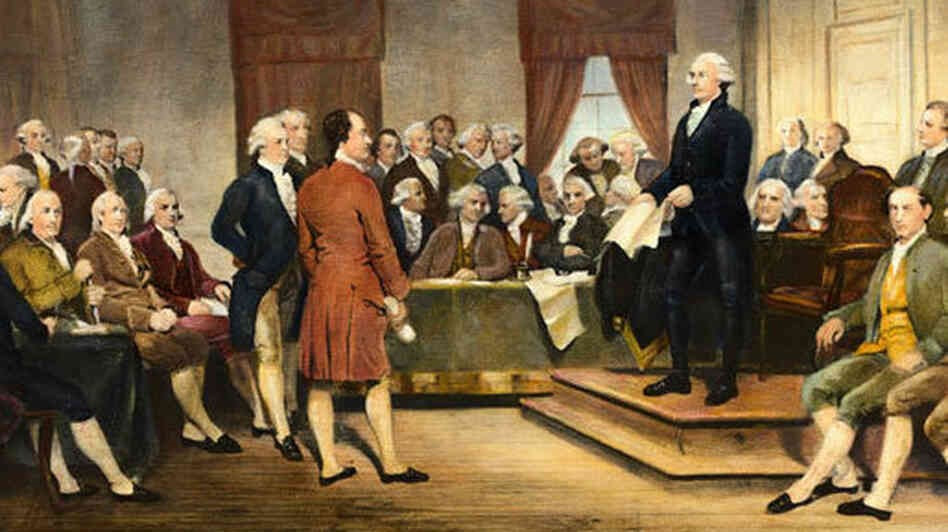|
Just as it did in 1865, Appomattox Day (the day when the South became a conquered colony of DC, a day that should be remembered by Southerners with mourning and fasting and prayer each year) will fall on Palm Sunday in 2023 – April 9th (following the Orthodox Church’s dating; the Protestants and Roman Catholics will be celebrating the Resurrection of the Lord Jesus Christ on that day). Because of this conjunction of the days, it is fitting to reflect once again on the narrative surrounding this War – its causes, its effects, the people and issues involved. Unfortunately, prominent conservatives continue to extol President Lincoln as the embodiment of a just and far-sighted political leader. Sohrab Ahmari, for instance, is in agreement with a new documentary ‘that Lincoln is the ideal thinker-practitioner of the American constitutional tradition’. The tradition in Mr. Ahmari’s and his fellow-travelers’ view is that the federal government is justified in trampling the sovereignty of the States to eradicate what it views as moral evils, constitutional limits and other niceties notwithstanding. The Southern historian Rod O’Barr, who has written some excellent essays at the Abbeville Institute lately, sees lots of problems in the Lincoln-as-crusading-anti-slavery-hero narrative. In reviewing the work of Dr. James McPherson, he writes,
Such revelations make it possible to discern the real cause behind the North’s war against the South:
The conquest of the South by the Yankees stripped the limited government façade from DC, destroyed the decentralizing inertia left from the era of the Articles of Confederation, with the devastating consequences still unfolding and compounding today:
Mr. O’Barr’s work here and elsewhere is generally beyond reproach, but he is wrong in one particular: It was not ‘Lincoln’s war [that] created the very monster the Founders so rightly opposed.’ That monster was birthed in 1787 during the constitutional convention in Philadelphia. The Anti-Federalist writer Federal Farmer explains (via TJ Martinell):
It is clear that what was birthed in Philadelphia and reached its maturity in the violence of Lincoln’s war is precisely a consolidated, and not a federal, government. Mr. O’Barr continues:
Knowing this, the conservative/revivalist/traditionalist political strategy vis-à-vis DC going forward must include two goals. The short-term goal would be what it always has been: Elect the most capable and virtuous conservatives for federal office that we possibly can to limit the carnage of the DC leviathan (along with a liberal use of State and local nullification). But the long-term goal must be to refashion the consolidated government created by the Philadelphia constitution into one that is truly federal, one in which the States wield the bulk of the power again. That will mean no House of Representatives; senators appointed by the governors or State legislatures; no national bank; a federal budget that is dependent at least in part on money supplied voluntarily by each State; no national army (each State raising and maintaining her own); unanimous or near unanimous consent for measures to be passed; and so forth. And this is assuming that all the States will want to remain together in a union, an assumption that is looking less and less tenable as the cultural divide between States and regions continues to widen. Abortion-promoting, transgender-friendly, gun-free, carbon-neutral, covid-totalitarian States like California, Oregon, and Washington and States like Louisiana, Mississippi, and Alabama that embrace traditional Christian teachings about marriage and family, child murder, and human sexual duality, maintain some respect for human free will in health care decisions, understand that people need a way to defend themselves from attackers, and can keep a reasonable balance between scientific innovation and care for the creation – why keep States so radically opposed in their beliefs and folkways yoked together? Maybe we are not far removed, here at the South anyway, from being able to praise our heroes once again without the disapproving scowls and howls of the Woke in DC and the Blue States, praise that they likewise garnered from foreign countries, the poet Philip Stanhope Worsley of England among them, who concluded a poem with these lines:
0 Comments
Leave a Reply. |
AuthorWalt Garlington is a chemical engineer turned writer (and, when able, a planter). He makes his home in Louisiana and is editor of the 'Confiteri: A Southern Perspective' web site. Archives
July 2024
|

